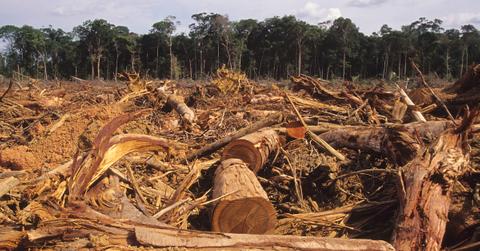The Modern Plant Extinction Rate Is the Worst It's Ever Been, According to New Study
Plants are going extinct far too quickly.
Updated June 11 2019, 6:40 p.m. ET

If you've been staying up-to-date on the climate crisis, you probably won't be too surprised at the results of a new study published by the journal Nature Ecology & Evolution this week. According to the study, plant extinction has progressed to a highly unnatural rate over the past century, climbing to 500 times quicker than what it was before the Industrial Revolution, EcoWatch reported. The study claims to provide a "comprehensive, global analysis of modern extinction in plants," and it shows how the climate crisis is affecting so many parts of the planet.
Nature published a summary of the paper, which studied more than 330,000 species of plants. The study found that since 1900, seed-bearing plants have been going extinct at a rate of about three species per year, which is 500 times higher than what the natural rate should be. In 1753, botanist Carl Linnaeus published the book Species Plantarum (The Species of Plants), which listed all known species of plants at that point. Since then, a total of 1,234 species were declared extinct. However, the study found that around half of those declarations turned out to be inaccurate, meaning 571 plants have gone extinct over the past 266 years.
In addition to the 571 plants that the researchers believe have gone extinct, many other plants are "functionally extinct," phylogeneticist Jurriaan de Vos told Nature. “You can decimate a population or reduce a population of a thousand down to one and the thing is still not extinct,” de Vos said. “But it doesn’t mean that it’s all OK.”
According to the study, Hawaii has lost the highest amount of seed-bearing plant species since 1900, having had 79 species go extinct over the past 119 years. South Africa's Cape comes in second, having lost 37 species since 1900.
The study's authors aren't just publishing this data to make people sad that plants are going extinct — they also used the data to predict which environments present the highest risk for plant species. They found that plants growing in biodiverse areas, places with rapidly-growing human populations, tropical environments, and on islands are most likely to go extinct — meaning that humans need to do more to protect plant species in high-risk areas.
So what exactly has accounted for all this? According to the Kew Royal Botanic Gardens website, the central cause is — unsurprisingly — human activity. Namely, human activity that directly destroys flora, such as clear cutting forests for agriculture, wood, or construction. Additionally, climate change has brought extreme weather patterns, such as drought and rainfall, to the planet, which can make it harder for certain plant species to flourish; soil pollution and water pollution have had a similar effect, Kew added.
One more leading question for you: Why is the survival of plant species so important, anyway? According to Dr. Eimear Nic Lughadha, one of the paper's authors, humans and animals cannot survive without plants. "Millions of other species depend on plants for their survival, humans included, so knowing which plants we are losing and from where, will feed back into conservation programs targeting other organisms as well," she told the BBC.
Additionally, as the BBC added, plants provide humans with things that are vital for our survival, such as oxygen and food; plus, plants help reduce greenhouse gases in the atmosphere by naturally absorbing CO2. That said, the more plant species that go extinct, the greater the chance of insect and animal species going extinct — so it's important to do everything we can to conserve every plant species on Earth. (Well, maybe every species except poison ivy.)